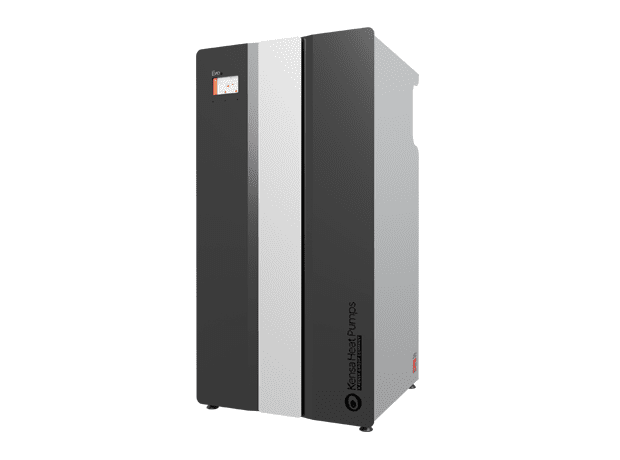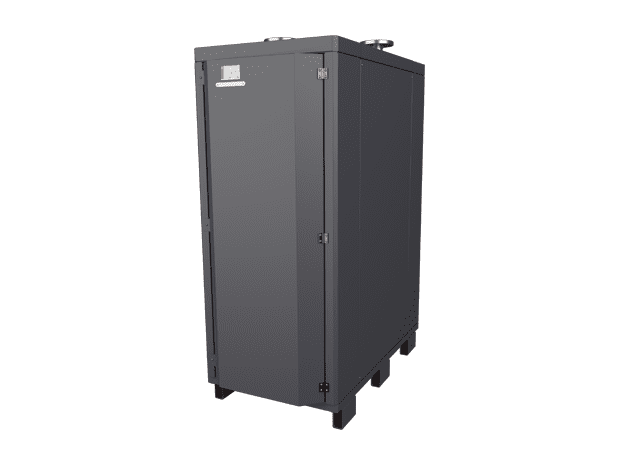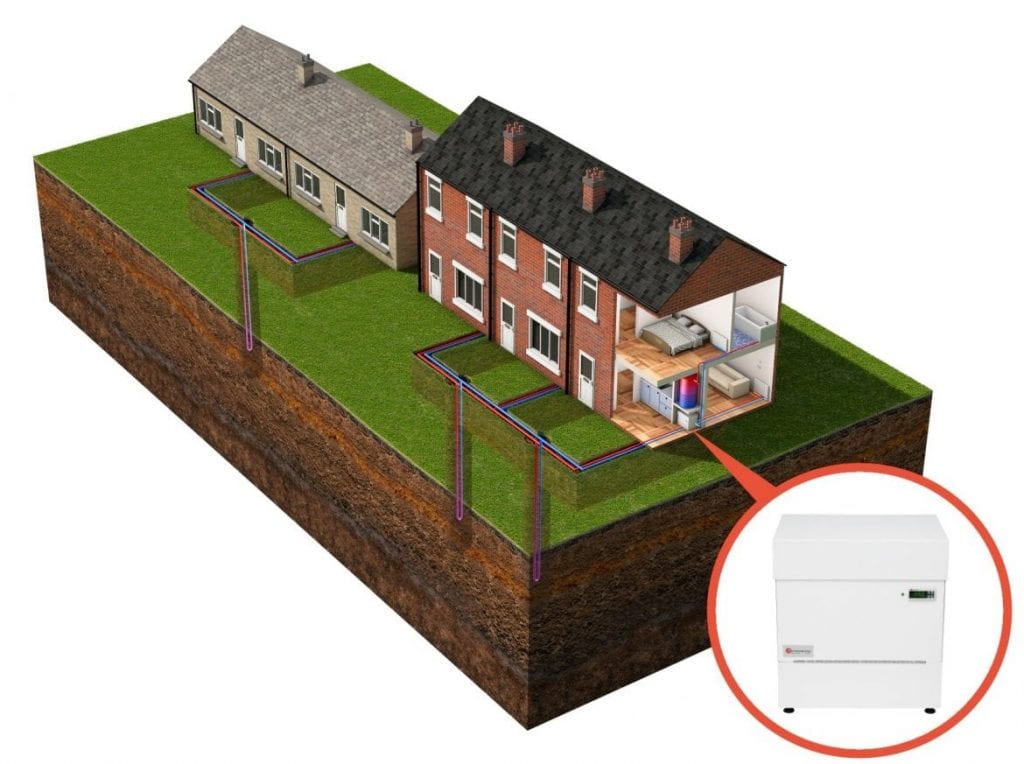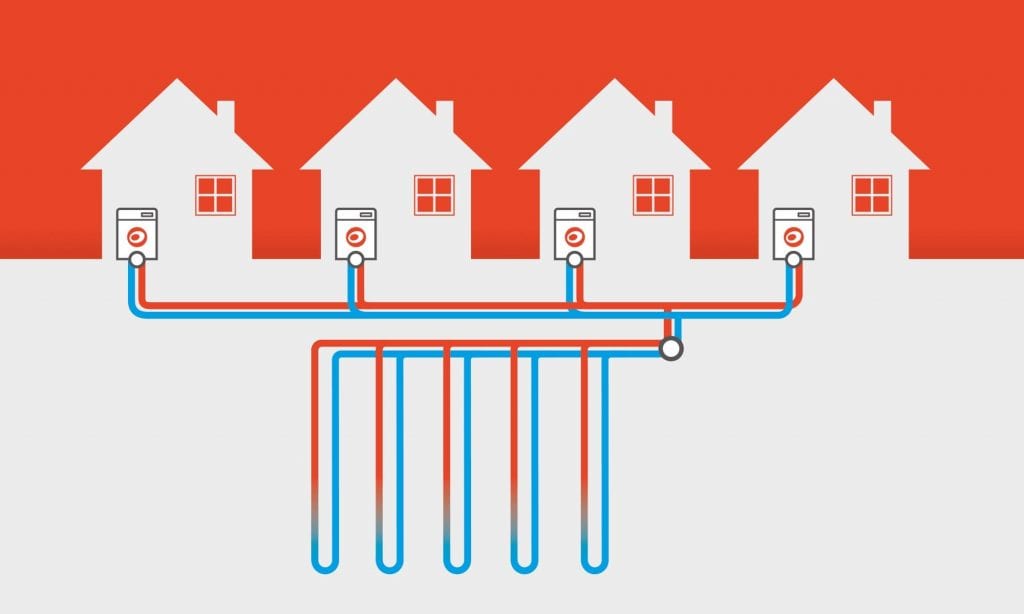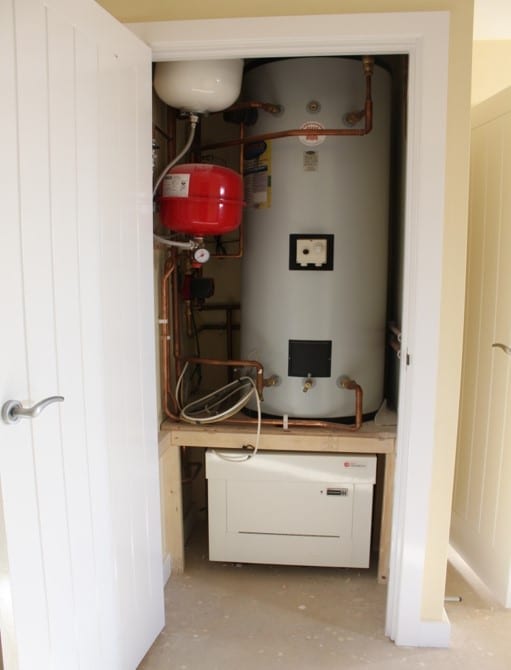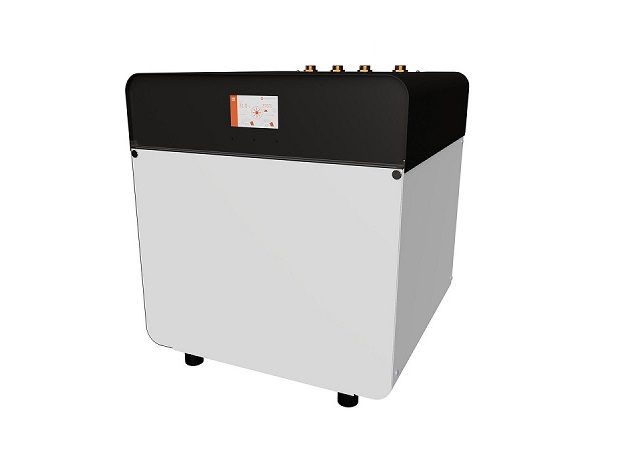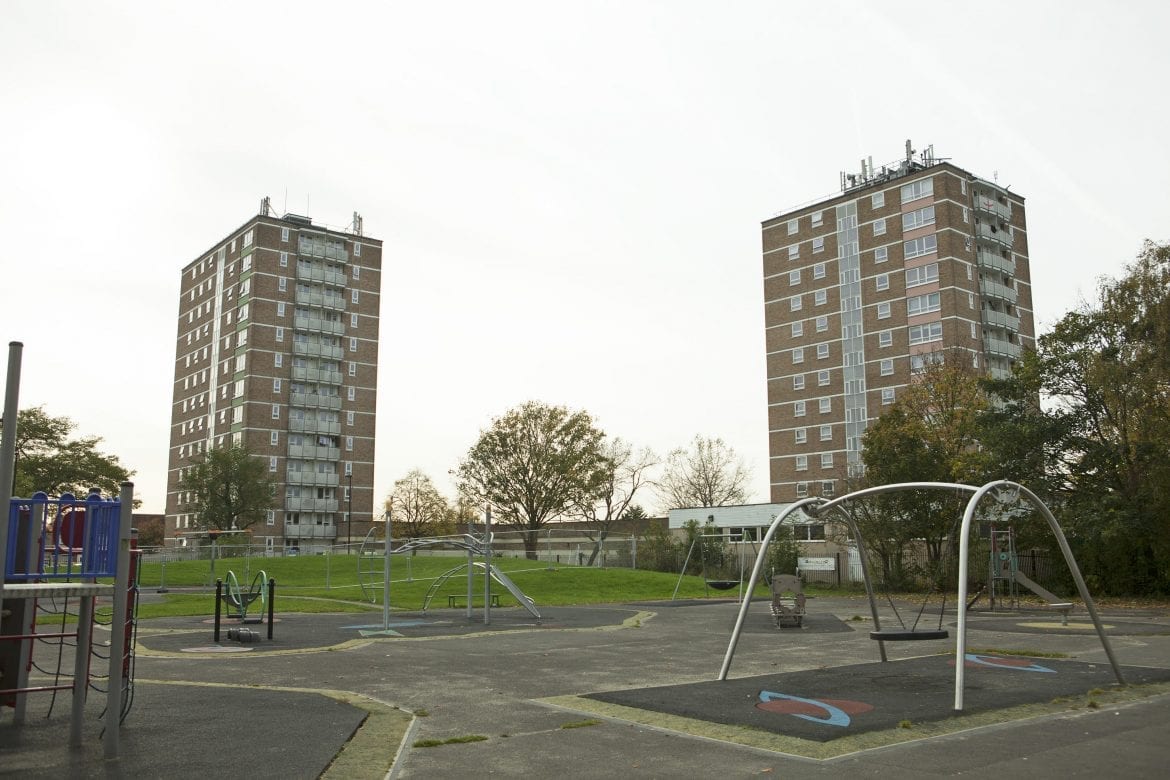Ground Source Heat Pumps for Social Housing
Ground source heat pumps keep tenants affordably warm all year round. By installing heat pumps, social housing providers can tackle fuel poverty and reduce household heating bills – relieving tenants of the ‘heat or eat’ ultimatum. Kensa’s systems also help providers to deliver on Climate Emergency Declarations and lower the carbon footprint of UK housing.
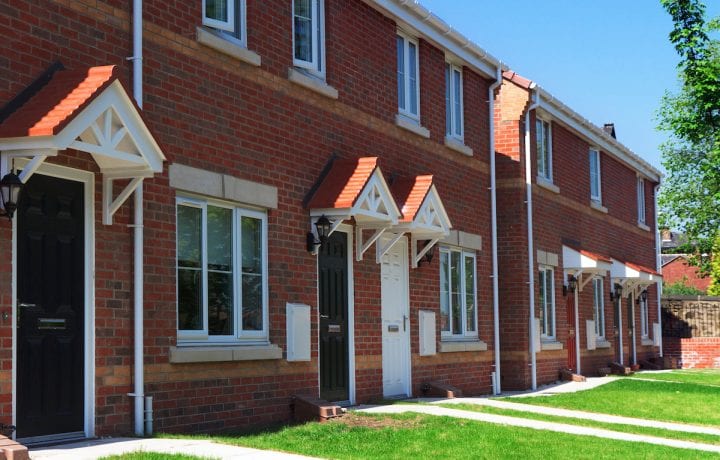
Why choose heat pumps for social housing?
Independent & easy-to-control heating
With Kensa’s Networked Heat Pump system – a low-carbon and decentralised district heating network with Shared Ground Loop Arrays – tenants have independent heating and hot water. A heat pump is installed inside each home to give them complete control over comfort levels. They even have the freedom to switch between energy suppliers.
Safe heating
Kensa’s Shoebox heat pump is a compliant and reliable match for social housing, particularly high rise buildings replacing gas combi boilers. Like all Kensa heat pumps, the Shoebox uses non-flammable refrigerant; a safe alternative to combustion fossil fuels and flammable-refrigerant renewables.
As well as that, non-combustion ground source heat pumps do not need flues, ensuring compliance with fire safety and building regulations.
Honour Climate Emergency Declarations
Ground source heat pumps emit no air pollution, bringing environmental improvements to the community. Using the lowest carbon form of heating, local authorities can take immediate action to reduce carbon emissions in social housing and honour Climate Emergency Declarations.
Download our social housing guide
Free cooling & no overheating
Networked Heat Pumps can offer passive cooling, while the ambient temperature of the distribution system prevents potential overheating.
Minimal disruption
The installation can be kept to the desired schedule, minimising disruption to tenants’ day-to-day lives. All works can be completed while tenants are in situ.

What are the cost-saving benefits for social housing?
Affordable heating
Ground source heat pumps use free renewable heat to cut heating bills by typically 30-50% when replacing night storage heaters. Providing affordable warmth, they can eradicate fuel poverty, reduce excess winter deaths, and improve tenant health and wellbeing.
Low-lifetime ownership costs
Landlords and tenants will appreciate the minimal maintenance, lack of annual servicing requirements and 20-year longevity of the heat pump. This ensures that whole-life ownership costs and disruptions are very low.
Split the costs
Housing associations unable to finance the most expensive element of a ground source heat pump system, ground arrays, can utilise a split ownership model to attract external investors to fund the ground arrays. In return, they can receive a ‘standing charge’ when heat pumps are connected to the infrastructure.
This makes the ground source heat pump project costs relative to that of an air source heat pump system, but with the added benefit of significant carbon, energy and lifetime cost savings.
With the support of Kensa, Trent & Dove Housing has achieved an outcome that many housing associations dream of; halved tenant energy bills, halved CO2 emissions in our stock, improved tenant health and well-being - and all of this in just 3 months.
More housing associations should be doing this - what are you waiting for?! Steve Grocock, Director of Property Services, Trent & Dove Housing
Why are heat pumps ideal for social housing heating?
They are perfect for community-scale schemes
Networked Heat Pumps bring communities together – in new or existing homes – to eradicate fuel poverty, reduce excess winter deaths and deliver significant carbon savings.
In Kensa’s Networked Heat Pump schemes, a ground source heat pump is installed into each home, providing heat and hot water at the point of use. By connecting individual heat pumps to an Ambient Heat Network with Shared Ground Loop Arrays, each household has independent energy bills, heating and hot water. The decentralised approach prevents issues such as heat loss through the distribution pipework and overheating – a common problem for traditional residential district heating systems.
Close-knit social housing communities can use Shared Ground Loop Array systems for quicker installations and reduced groundwork costs by sharing smaller numbers of deeper boreholes. Using the drilling equipment whilst on site means projects can save on multiple mobilisation costs compared to disparate projects.

They offer the most efficient approach to heating & cooling
Building regulations and Energy Performance Certificates (EPCs) demand lower carbon emissions than ever before. By delivering efficiencies to, and occasionally beyond 400%, a heat pump is social housing’s answer to energy efficiency now and in the future.
The more the electricity grid decarbonises, the lower the carbon factor associated with ground source heat pumps becomes; Kensa ground source heat pumps installed today will have lower carbon factors in the future as hydro, solar and wind power dominates the electricity grid.
They provide smart & controllable heating
Ground source heat pumps can be combined with smart controls to enhance comfort and savings for tenants.
By using smart controls that learn a household’s heating preferences and building heat physics, tenants can avoid the peaks of grid strain and shift the heat pump’s power consumption to the times when the grid can best accommodate it – when there is lower carbon and lower-cost electricity. The heat pump will turn on when there is extra electrical capacity, and turn off when the grid is under strain from peak electricity times.
Ground source heat pumps have far more potential to participate in load shifting initiatives than air source variants, as the ground is a very stable temperature heat source. A ground source heat pump can be run at the same efficiency any time of day or night.
The grid generally generates excess power overnight, and some of the variable tariffs can go negative. When that happens, people actually get paid for running their heating.
They tackle fuel poverty
In existing homes, space and water heating accounts for two-thirds of a typical household bill. By replacing expensive heating systems – such as night storage heaters – with low-running-cost ground source heat pumps, social landlords can immediately reduce fuel poverty and improve tenant wellbeing.
Ground source heat pumps rely on just one-third of paid electrical energy input to deliver 100% of a property’s heating and hot water needs. By providing resilience against rising fuel prices and energy security, they can prevent future fuel poverty in homes.
Whether in new social housing or replacement heating system installations, heat pumps give tenants the lowest heating and hot water costs and highest levels of energy efficiency. They can even choose their own energy provider to get the best price.
All in all, ground source heat pumps tackle fuel poverty like no other communal heating system.
Energy saving tips for rented properties
Kensa has compiled some energy-saving suggestions to share with residents to raise awareness of energy efficiency and help reduce the cost of their energy bill. Download these tips as a shareable PDF.
Download PDF

Our Wellbeing Plan commits us to a continual improvement in our energy use and carbon footprint. This project is a fantastic example of how we can use renewable energy sources to help reduce our carbon footprint, tackle fuel poverty and support the global agreement to achieve net-zero emissions by the second half of the century. Rebecca Hazlewood, Flagship Housing Group
They help UK housing achieve net-zero targets
The UK government has ambitious, legally binding targets to reduce greenhouse gas emissions by at least 100% by 2050 (compared to 1990 levels). The switch to low-carbon heat with ground source heat pumps in social housing – which makes up a sixth of the UK’s housing stock – will significantly help to reduce emissions and achieve the UK’s net-zero targets.¹
Heating and hot water for UK homes make up 25% of total energy use and 15% of our greenhouse gas emissions.² The UK Heat Strategy recognises that heat pumps have a critical part to play in meeting future residential heat demand, while the Committee on Climate Change sees the installation of heat pumps as an infrastructure priority.
How much do heat pumps in social housing cost?
Project cost for retrofitting heat pump systems into 60 flats
This example portrays the typical costs of replacing night storage heaters with heat pumps in 60 flats. A Shoebox heat pump is fitted into each property, connected to a Shared Ground Loop Array of boreholes:
- Pay £698,500 for the heat pump and groundwork installation.
- Save £484,045 over 20 years in running costs vs. night storage heaters.
Project cost for 85 new-build homes
This example is based on installing heating and hot water systems in 85 newly built social housing homes. This project features a Shoebox heat pump in each home, connected to a Shared Ground Loop Array of boreholes:
- Pay £606,960 for the heat pump and groundwork installation.
- Save £31,509 over 20 years vs. gas combi boilers.
See more on our pricing page
What is the best heat pump for social housing?
The Original Shoebox heat pump
Kensa’s Shoebox ground source heat pump is commonly used to replace ageing night storage heaters, gas boilers in tower blocks, and costly exhaust air heat pumps.
The Shoebox fits easily into an airing cupboard, or often underneath a new hot water cylinder to distribute hot water and heat via upgraded radiators. It provides 100% of the property’s heating and hot water needs.
See the Shoebox series
The NEW Shoebox NX ground source heat pump
The Shoebox NX ground source heat pump is a complex powerhouse with A+++ efficiency and quiet operation. The Shoebox NX is easy to install and ideal for all property types, including ‘complex-to-decarbonise’ flats, terraces and tenements.
The NX comes with a 25+ year life expectancy and minimal maintenance, without the risks and servicing of fossil fuel systems.
See the NEW Shoebox NX series
How does a social housing project work with Kensa?
Support from Kensa Contracting
Our approach is very different from typical suppliers. Kensa Heat Pumps is first and foremost a manufacturer. However – whether for new build or refurbishment schemes – our specialist delivery arm, Kensa Contracting, provides complete project management, including direct supply from Kensa Heat Pumps, full system design, delivery, compliance and post-installation support of our systems for social housing customers.
Tenant liaison
This support is absolutely key, both to ensure the quality and sustainability of the installations, but also to ensure that delivery is well-managed and hassle-free. Kensa introduces schemes to tenants to make sure they’re aware of what’s involved in a heat pump installation, what to expect, and how the project will benefit them in the long term.
Get a quote from Kensa Contracting
Heat pump case studies in social housing
Over 400 flat retrofits in Enfield

Across eight tower blocks in the London borough of Enfield, inefficient electric heating was pushing tenants towards fuel poverty. They had no control over their heating and no choice but to pay a fixed monthly payment towards heating and hot water.
In England’s largest Shared Ground Loop Array scheme, Kensa Contracting teamed up with Enfield Council and ENGIE to swap pricey electric for ground source heat pumps. As a result, tenants are saving between £450-700 every year on their heating. Reflecting on the positive impact of the project, Enfield Council commented:
This is an eco-friendly system that has enabled residents to save between £450-700 a year in heating costs at a time when household budgets are being squeezed. This project is good for residents and good for Enfield.
See the Enfield case study
12 affordable new-build homes in Somerset

To complement the construction of 12 affordable homes, South Western Housing wanted efficient and sustainable heating systems. They chose to install Kensa’s ground source heat pumps.
The heat pumps provide tenants with low-cost and eco-friendly heating. Paul Davies, Senior Surveyor for the project, commented:
The new homes are excellent examples of great design and the embodiment of modern technology to ensure they sit well with the local character and tradition. [Ground source heat pumps] provide both heating and hot water from a sustainable source, which the occupier and the society will benefit from long term with reduced energy bills and happy tenants.
See South Western Housing’s case study
49 bungalow retrofits in Hertfordshire
With tenants off the gas grid and facing expensive energy bills, Stonewater Housing wanted an affordable replacement for storage heaters. Ground source heat pumps were the answer.
The result? Heating bills have halved for the tenants. Leon Storer from Stonewater Housing said:
Not only do our residents benefit from significantly reduced bills, more controllable heating and improved health and well-being, CO2 emissions are halved and Stonewater gains an income from ECO funding.
See Stonewater’s case study
Submit your plans to Kensa Contracting
Award-winning heat network delivery partners & contractors
Visit our sister site for social housing ground source heat pump advice, and submit your plans to get a quote for your project.
SUBMIT YOUR PLANS
References
1. Comparing affordable housing in the UK: April 2008 to March 2018, Office for National Statistics
2. UK housing: Fit for the future? Committee on Climate Change, 2019
Related Content
Ground Source Review: Flagship Group. During Spring 2016 Kensa Contracting completed a compact and challenging heating upgrade programme for the Flagship Group featuring 11 properties on an estate in Fressingfield built in 2010. The project showcases the largest variety of communal ground source heat network designs installed on one site to date. READ IN FULL AT KENSACONTRACTING.COM
In Spring 2015 Trent & Dove Housing and Kensa Contracting delivered the UK’s most ambitious retrofit upgrades programme of its time, replacing electric night storage heating with Kensa ground source heat pumps connected to a micro heat network over 133 one and two-bedroom bungalows over 15 different sites throughout Burton-upon-Trent. This video documents this multi-award-winning…
Download Kensa’s short guide to retrofitting ground source heat pumps in social housing.




